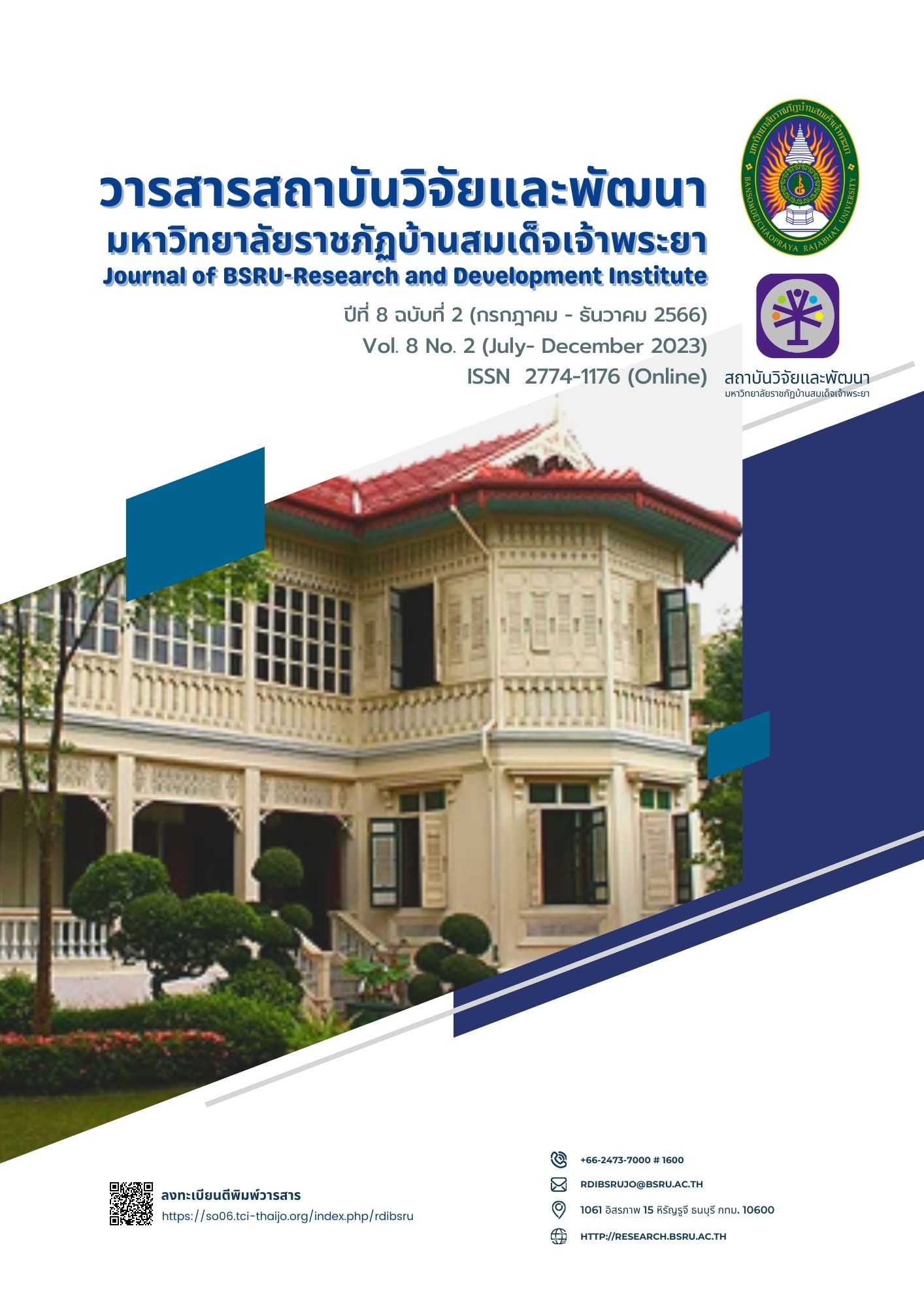การเก็บความลับเพื่อการพัฒนาอัตมโนทัศน์: การศึกษาการพัฒนาอัตมโนทัศน์ของตัวละครเอกในนวนิยายเรื่อง Can You Keep a Secret?
คำสำคัญ:
การพัฒนาอัตมโนทัศน์, องค์ประกอบของอัตมโนทัศน์, การเก็บความลับ, Can You Keep a Secret?บทคัดย่อ
งานวิจัยนี้มีวัตถุประสงค์เพื่อศึกษาการพัฒนาอัตมโนทัศน์ของตัวละครเอกในนวนิยายเรื่อง Can You Keep a Secret? ของผู้แต่ง Sophie Kinsella โดยวิเคราะห์ผลกระทบจากการเก็บความลับ โดยใช้ทฤษฎีองค์ประกอบของอัตมโนทัศน์ของ Carl Roger เป็นกรอบในการวิเคราะห์ ผลการวิเคราะห์แสดงให้เห็นผลกระทบจากการเก็บความลับต่อองค์ประกอบของอัตมโนทัศน์ ซึ่งนำไปสู่การพัฒนาอัตมโนทัศน์ ตัวละครเอกของเรื่องพัฒนาความเคารพในตนเองผ่านการเก็บความลับนำไปสู่การพัฒนาภาพลักษณ์ของตนเอง และผลลัพธ์จากการพัฒนาภาพลักษณ์ของตนเองทำให้ตัวละครเอกบรรลุศักยภาพสูงสุดของตนเอง
Downloads
เอกสารอ้างอิง
Afifi, W. A., & Caughlin, J. P. (2006). A Close Look at Revealing Secrets and Some Consequence That Follow. Communication Research, 33(6), 467-488. https://doi.org/doi.org/10.1177/0093650206293250
Alicke, M., & Sedikides, C. (2009). Self-Enhancement and Self-Protection: What They are and What They Do. European Review of Social Psychology - EUR REV SOC PSYCHOL, 20, 1-48. https://doi.org/10.1080/10463280802613866
Austina, M. F. (2011). How Chick-Lit Affects Women Through Romance Formula: A Study Case On Lauren Weisberger's Devil Wears Prada And Jane Green's. Journal of English and Education, 5(1), 76-86. https://doi.org/10.20885/jee.vol5.iss1.art6
Bailey, J. A. (2003). Self-Image, Self-Concept and Self-Identity Revisited. Journal of The National Medical Association, 95(5), 383-386. https://www.ncbi.nlm.nih.gov/pmc/articles/PMC2594523/
Beheshtifar, M., & Rahimi-Nezhad, Z. (2012). Role of Self-Concept in Organization. European Journal of Economics, Finance and Administrative Sciences, 44, 159-163. (www.researchgate.net/publication/281175780_Role_of_Self-Concept_in Organizations.)
Brewis, J. (2004). Sex and Not the City? The Aspirations of the Thirty-something Working Woman. Urban Studies, 41(9), 1821-1838. https://doi.org/10.1080/0042098042000243174
Carroll, A., Houghton, S., Wood, R., Perkins, C., & Bower, J. (2007). Multidimensional Self-Concept: Age and Gender Differences in Australis High School Students Involved in Delinquent Activities. School Psychology International, 28(2), 237-256. https://doi.org/10.1177/014303430707810
Epstein, S. (1978). The Self-Concept Revisited or a Theory of a Theory. 28(5), 404-416. https://doi.org/10.1037/h0034679
Heylighen, F. (1992). A Cognitive-Systemic Reconstruction of Maslow's Theory of Self-Concept. Behavioral Science, 37(1), 39-57. https://doi.org/10.1002/bs.3830370105
Isamail, N. A. H., & Takke, M. (2015). Rediscovering Roger’s Self-Theory and Personality. Journal of Educational, Health and Community Psychology, 4(3), 28-36. (https://www.researchgate.net/publication/286456614_Rediscovering_Rogers's_Self_Theory_and_Personality.)
Kinsella, S. (2018). Can You Keep a Secret? Penguin Random House.
Leary, M. R., & Baumeister, R. (2000). The Nature and Function of Self-Esteem: Sociometer Theory. Advance In Experimental Social Psychology, 32, 1-62. https://doi.org/10.1016/S0065-2601(00)80003-9
Lewandowski Jr, G. W., & Nardone, N. (2010). The Role of Self-concept Clarity in Relationship Quality. Self and Identity, 9, 416-433. https://doi.org/10.1080/15298860903332191
Mazloomian, M., Raihanah M. M., & Hamdan, S. I. (2016). Love Relationship and Identity Development in Selected Asian American Chick Lit. Journal of Language Studie, 16(2), 155-117. https://doi.org/10.17576/gema-2016-1602-10.
McWilliams, E. (2009). Margaret Atwood and the Female Bildungsroman. Routledge.
Monell, E., Hogdahl, L., Mantilla, E. F., & Birgegard, A. (2015). Emotion Dysregulation, Self-Image and Eating Disorder Symptoms in University Women. Journal of Eating Disorders, 3(44), 1-11. https://doi.org/10.1186/s40337-015-0083-x
Murray, S. L., Derrick, J. L., Leder, S., & Holmes, J. G. (2008). Balancing Connectedness and Self-Protection Goals in Close Relationship: A Levels-of-Processing Perspective on Risk Regulation. Journal of Personality and Social Psychology, 94(3), 429-459. https://doi.org/10.1037/0022-3514.94.3.429
Nugroho, M. A. B., & Viladinia, S. (2018). Audrey Tuner's Conflicts and Defense Mechanisms in Kinsella's 'Finding Audrey'. LEKSEMA: Jurnal Bahasa dan Sastra, 3(1), 45-54. https://doi.org/10.22515/ljbs.v3i1.1146
ดาวน์โหลด
เผยแพร่แล้ว
ฉบับ
ประเภทบทความ
สัญญาอนุญาต
บทความ ข้อความ ภาพประกอบ และตารางประกอบที่ลงพิมพ์ในวารสารเป็นความคิดเห็นส่วนตัวของผู้นิพนธ์ กองบรรณาธิการไม่จำเป็นต้องเห็นตามเสมอไป และไม่มีส่วนรับผิดชอบใดๆ ถือเป็นความรับผิดชอบของผู้นิพนธ์เพียงผู้เดียว






